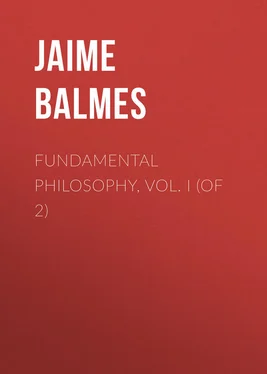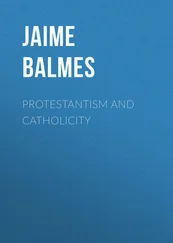Jaime Balmes - Fundamental Philosophy, Vol. I (of 2)
Здесь есть возможность читать онлайн «Jaime Balmes - Fundamental Philosophy, Vol. I (of 2)» — ознакомительный отрывок электронной книги совершенно бесплатно, а после прочтения отрывка купить полную версию. В некоторых случаях можно слушать аудио, скачать через торрент в формате fb2 и присутствует краткое содержание. Жанр: foreign_antique, foreign_prose, на английском языке. Описание произведения, (предисловие) а так же отзывы посетителей доступны на портале библиотеки ЛибКат.
- Название:Fundamental Philosophy, Vol. I (of 2)
- Автор:
- Жанр:
- Год:неизвестен
- ISBN:нет данных
- Рейтинг книги:3 / 5. Голосов: 1
-
Избранное:Добавить в избранное
- Отзывы:
-
Ваша оценка:
- 60
- 1
- 2
- 3
- 4
- 5
Fundamental Philosophy, Vol. I (of 2): краткое содержание, описание и аннотация
Предлагаем к чтению аннотацию, описание, краткое содержание или предисловие (зависит от того, что написал сам автор книги «Fundamental Philosophy, Vol. I (of 2)»). Если вы не нашли необходимую информацию о книге — напишите в комментариях, мы постараемся отыскать её.
Fundamental Philosophy, Vol. I (of 2) — читать онлайн ознакомительный отрывок
Ниже представлен текст книги, разбитый по страницам. Система сохранения места последней прочитанной страницы, позволяет с удобством читать онлайн бесплатно книгу «Fundamental Philosophy, Vol. I (of 2)», без необходимости каждый раз заново искать на чём Вы остановились. Поставьте закладку, и сможете в любой момент перейти на страницу, на которой закончили чтение.
Интервал:
Закладка:
CHAPTER III.
CERTAINTY OF THE HUMAN RACE, AND PHILOSOPHICAL CERTAINTY
16. Certainty does not originate in reflection; it is the spontaneous product of man's nature, and is annexed to the direct act of the intellectual and sensitive faculties. It is a condition necessary to the exercise of both, and without it life were a chaos; we therefore possess it instinctively, and without any reflection, and we enjoy the fruit of this as of all those other benefits of the Creator, which are inseparably joined to our existence.
17. It is, then, necessary to distinguish between the certainty of the human race and philosophical certainty, although, to speak frankly, it is not easy to conceive what can be the value of any human certainty distinct from that of the human race. If we set aside the efforts which the philosopher sometimes makes to discover the basis of human knowledge, we shall readily find him confounded with the rest of mankind. This cavil leaves no trace in his mind with respect to the certainty of all that the human race is certain of. He then discovers that the doubt which he felt was not a real doubt, although he may have deluded himself into a contrary belief. His doubts were simple suppositions, nothing more. When his meditation is over, and perhaps even while it lasts, he finds that he is as certain as the most ignorant individual of his internal acts, the existence of his own body, of other bodies around him, and of a thousand other things, which constitute the amount of knowledge requisite to the wants of life.
Question all, from the infant of a few summers, to the sage of many years and mature judgment, on the certainty of their own existence, their acts internal or external, their friends and relatives, the people among whom they dwell, objects seen or heard of, and you will not detect any hesitation in their answers, or any kind of difference in the grades of their certainty. If they have no knowledge of the philosophical questions touching these matters, you may read in their countenances wonder and astonishment that any one should seriously investigate things so evident .
18. Impossible as it is for us to know in what manner the sensitive, intellectual, and moral powers of children are developed, it is equally impossible to prove a a prior , by analyzing the operations of his mind, that reflex acts do not concur to the formation of certainty; but it will not be difficult to find proofs of this in the exercise of these faculties when well developed. If we observe attentively, we shall see that the child's faculties habitually operate in a direct, not a reflex manner; which shows that the development is made directly, not by reflection. Were the primitive development the work of reflexion, the reflective power would be great in the child. But this is not the case. Very few men are ever endowed with it, and in the greater part of them it is very nearly null. They who attain to it, acquire it only by assiduous labor, and not without great violence to himself, can any one pass from direct to reflex cognition.
19. No matter what you teach a child, he perceives it indeed, but call his attention to the perception itself, and his understanding is at once obscured and confused. Let us make the experiment. Suppose we would teach a child the elements of geometry.
"Do you see this figure bounded by three lines? It is called a triangle; the lines are called sides, and the points where they unite the vertices of the angles." – "I understand that." – "Do you see this other figure bounded by four lines? It is called quadrilateral, and, like the triangle, has its sides and vertices of angles." – "Very well." – "Can a quadrilateral figure be a triangle, or vice versa ?" – "It cannot." – "Never?" – "Never." – "Why not?" – "One has three, and the other four sides: how then can they be the same thing?" – "Who knows? It may seem so to you, but – " – "See here! This has three, and this four sides; and three and four are not the same thing."
Torture his understanding as much as you please, but you cannot drive him from his position: and thus we see that his perception and his reason operate directly, that is, by direct application to the object. Of himself he does not direct his attention to his own internal acts, does not think upon his own thoughts, does not combine reflex ideas, nor seek in them the certainty of his judgment.
20. And here we detect a vital error in the art of thinking as it has hitherto been taught. The young intellect is exercised in reflection, the most difficult part of science, which is as inconsiderate as it would be to commence his physical development by the most painful gymnastic exercises. Man's scientific development should be governed by his natural development, which is direct not reflex.
21. Let us apply this remark to the exercise of the senses. "Do you hear that music?" asks the child. – "What music?" – "Did you not hear it? Are you deaf?" – "It seems to you that you hear it." – "But, sir, I hear it so distinctly! How can it be possible?" – "But how do you know?" – "I hear it."
From his I hear it you cannot drive him: he will not hesitate a moment, nor will he appeal to any reflex act in order to avoid your importunities. " I hear it : do not you hear it?" He asks nothing more, and all your philosophy cannot equal the irresistible force of sensation which assures him that there is music, and that whoever doubts it is either deaf or in jest.
22. Had the faculties of the child been developed by alternate direct and reflex acts; had he, when acquiring knowledge of things, thought of something besides the things themselves; evidently a continuation of such acts would have left some impression on his mind, and urged to assign the motives of his certainty, he would indicate those very means that he made use of in the gradual development of his faculties; he would abstract the object, retire into himself, think upon his own thought in one way or another, and thus encounter the difficulty. Nothing of this character takes place, which proves that no such reflex acts have been performed, that there have been only perceptions accompanied by internal consciousness and certainty of their existence; but all in a confused, instinctive manner, without any thing like philosophical reflection.
23. What has been said of the child, may be proved true also of adults, however clear and perfect their intellect. If not initiated into questions of philosophy, they will give very nearly the same answers to difficulties proposed on the same matters, and even upon many others more exposed to doubt. Experience proves better than all ratiocination that no one acquires certainty by reflex acts.
24. Philosophers teach that the sources of certainty are the internal sense or consciousness of acts, the external senses, common sense, reason, and authority. A few examples will show us that there is reflection in all these, and how most men, and even philosophers, when they act like men and not like philosophers, think.
25. Suppose a clear-headed person, one however who is ignorant of the questions of certainty, has just seen some monument, the Escurial for instance, which leaves a lively and lasting impression on his mind, and while he recollects his gratification on seeing it, try to make him doubt the existence of this recollection in his mind, and its correspondence as well with the act of seeing as with the edifice itself, and he will very certainly think you are in jest, or will be astounded, and will suspect you of being out of your senses. He discovers no difference between things different as are the actual existence of his recollection, its correspondence with the past act of seeing, and the agreement of both with the edifice seen. He knows in this case no more than a child of six years: "I recollect it, I saw it, it is as I recollect it." This is all his science: he neither reflects, nor separates; all is direct and simultaneous.
Читать дальшеИнтервал:
Закладка:
Похожие книги на «Fundamental Philosophy, Vol. I (of 2)»
Представляем Вашему вниманию похожие книги на «Fundamental Philosophy, Vol. I (of 2)» списком для выбора. Мы отобрали схожую по названию и смыслу литературу в надежде предоставить читателям больше вариантов отыскать новые, интересные, ещё непрочитанные произведения.
Обсуждение, отзывы о книге «Fundamental Philosophy, Vol. I (of 2)» и просто собственные мнения читателей. Оставьте ваши комментарии, напишите, что Вы думаете о произведении, его смысле или главных героях. Укажите что конкретно понравилось, а что нет, и почему Вы так считаете.












